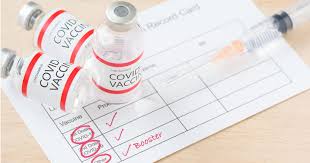COVID booster update from the BGHC

On March 28 the U.S. Food and Drug Administration authorized the use of a second COVID-19 booster shot for persons over the age of 50. Additionally, persons over the age of 18 with compromised immune systems are also eligible for a second booster shot. Both Pfizer and Moderna mRNA shots have been granted emergency use authorization – or EUA – for a second booster. Both vaccines seem to be equally effective in boosting neutralizing antibody levels and immunity. Both vaccines can be given as second boosters at four months or more after previous booster administration.
There is ongoing scientific (there is that word again, sorry) debate about the overall need and treatment goals of a second booster. There is NO debate about the importance and efficacy of the full vaccination series and one booster injection. Full vaccination and one booster dose are more than 90 percent effective in preventing both serious infection and hospitalization from COVID-19. This efficacy appears to last for three to six months, depending on the study population. After this postvaccination period, the efficacy begins to slowly wane. As a result, protection against COVID-19 variants such as Omicron may be reduced as time goes on after vaccination.
Because of the gradual reduction in neutralizing antibody levels to the spike protein of COVID-19, the associated reduction in protection seen after three to six months of vaccination, and the appearance of COVID-19 variants such as BA.2 which harbor mutated versions of the spike protein, a second mRNA booster vaccination is being offered now.
The vaccine is proposed for all adults over the age of 50 and those over the age of 18 with compromised immune systems. The second booster is, however, emphasized for the elderly (hello, Florida), and those persons with coexisting medical conditions associated with poor outcome if complicated by COVID-19 infection. For instance, persons with diabetes, chronic lung disease, heart disease in heart failure, and cancer patients or transplant patients receiving active immunosuppressive therapy should consider a second COVID-19 booster. If there is a question about risk, persons should ask their physician (not pharmacist) for advice.
There is no evidence that a second booster produces more side effects or other toxicity than previous vaccinations. A second booster can be delayed if desired. Otherwise, healthy, younger persons who have recovered from COVID-19 may choose to delay a second booster, as natural immunity after active COVID-19 infection results in strong and durable protection from subsequent COVID-19 infection, including the new BA.2 variant. Persons recently or currently infected by COVID-19 should not receive additional vaccination until recovered from symptoms, usually waiting 90 days after the illness.
The timing of the second booster is not fixed but must be given four months or more after the previous vaccination. For those persons at risk of developing serious medical complications from COVID-19 infection, now is probably the right time for vaccination. For those planning travel to regions with high infection rates, vaccination at least two weeks before travel would be appropriate. For those who are healthy, fully vaccinated and boosted, waiting until the fall or until there is more evidence of another COVID-19 surge can make sense. “Time will tell,” as my brother-in-law often says.
In 1991 someone at the Boca Grande Health Clinic (the signature is missing) offered a mock free drawing with the winner receiving a free clinic visit for a vaccine protective against such widespread conditions as gout, leptospirosis, blackwater fever, amnesia, and facial wrinkles. The winner never came to claim this mythical vaccine. In 2022 the Boca Grande Health Clinic will offer Moderna mRNA vaccine regularly to those fine citizens who wish for either booster or initial COVID-19 vaccination.
Call the Clinic at 964-2276 if you wish to make an appointment.
Thomas. J. Ervin M.D









